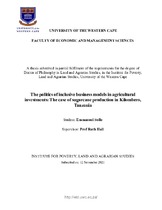The politics of inclusive business models in agricultural investments: The case of sugarcane production in Kilombero, Tanzania
Abstract
In recent years, donors, policy makers, and non-governmental organisations working on land
and agricultural issues have latched onto the catch phrase ‘inclusive business models’ as an
alternative to large-scale land acquisitions. Development actors promote these inclusive models,
such as contract farming or outgrowing schemes, to mitigate the often significant and adverse
impacts of land grabs on rural people while still supporting foreign direct investments,
particularly in agriculture in developing countries. The need to increase investments in
agriculture in developing countries is clear, however, it is important to assess how such
investments are implemented and who benefits from them and who loses.

